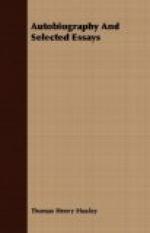But, you will say, all this is fault-finding; let us hear what you have in the way of positive suggestion. Then I am bound to tell you that, if I could make a clean sweep of everything—I am very glad I cannot because I might, and probably should, make mistakes,—but if I could make a clean sweep of everything and start afresh, I should, in the first place, secure that training of the young in reading and writing, and in the habit of attention and observation, both to that which is told them, and that which they see, which everybody agrees to. But in addition to that, I should make it absolutely necessary for everybody, for a longer or shorter period, to learn to draw. Now, you may say, there are some people who cannot draw, however much they may be taught. I deny that in toto, because I never yet met with anybody who could not learn to write. Writing is a form of drawing; therefore if you give the same attention and trouble to drawing as you do to writing, depend upon it, there is nobody who cannot be made to draw, more or less well. Do not misapprehend me. I do not say for one moment you would make an artistic draughtsman. Artists are not made; they grow. You may improve the natural faculty in that direction, but you cannot make it; but you can teach simple drawing, and you will find it an implement of learning of extreme value. I do not think its value can be exaggerated, because it gives you the means of training the young in attention and accuracy, which are the two things in which all mankind are more deficient than in any other mental quality whatever. The whole of my life has been spent in trying to give my proper attention to things and to be accurate, and I have not succeeded as well as I could wish; and other people, I am afraid, are not much more fortunate. You cannot begin this habit too early, and I consider there is nothing of so great a value as the habit of drawing, to secure those two desirable ends.
Then we come to the subject-matter, whether scientific or aesthetic, of education, and I should naturally have no question at all about teaching the elements of physical science of the kind I have sketched, in a practical manner; but among scientific topics, using the word scientific in the broadest sense, I would also include the elements of the theory of morals and of that of political and social life, which, strangely enough, it never seems to occur to anybody to teach a child. I would have the history of our own country, and of all the influences which have been brought to bear upon it, with incidental geography, not as a mere chronicle of reigns and battles, but as a chapter in the development of the race, and the history of civilisation.




